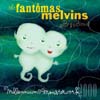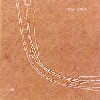 According to the liner notes, Brombron is "a joint project by extrapooland staalplaat and receives financial support from mondriaanstichting." Quite what all that means, I don't know, but apparently theboys got some studio time to work on this record specifically. And itwas money well spent for their patrons because this is an excellentexposition of the more musical end of microsound-style laptopcomposition, a subgenre put decisively on the map by ChristianFennesz's low-bitrate eye-opener 'Endless Summer.'
According to the liner notes, Brombron is "a joint project by extrapooland staalplaat and receives financial support from mondriaanstichting." Quite what all that means, I don't know, but apparently theboys got some studio time to work on this record specifically. And itwas money well spent for their patrons because this is an excellentexposition of the more musical end of microsound-style laptopcomposition, a subgenre put decisively on the map by ChristianFennesz's low-bitrate eye-opener 'Endless Summer.' As on Mathieu's equally pleasing 'frequencyLib' album, much of thealbum is about processing samples from hinted-at sources and givingthem a new identity, but there's also nice use of a field recording andoutright, er, covers, you might say. Unlike many records in themicrosound genre, no harsh noise pieces are found here. Instead thereare thirteen subtle tracks, starting with the straightfireworks-field-recording-and-organ of "New Years Eve". (Clearly JimO'Rourke didn't exhaust the potential of recorded fireworks on GastrDel Sol's 'Camofleur'.)
Other highlights are the processed warble of "Turkey Song"—a revivalisttake on Peanuts which clearly influenced the soundtrack picks in 'TheRoyal Tenenbaums', and which, along with "Vinnie's Theme", punctuatesthe album with a sense of humour. A further bonus is the special cardpackaging, unique to the Brombron series, which holds the CD in placewithout a spot of plastic, glue, or even one of those annoying Mort AuxVaches fold-out clips. The record's been out the best part of a year,and is apparently limited, so seek out a copy while you can.
samples:



 It sounds like a joke for indie music hipsters: what do you get whenyou mix The Melvins, Fantomas and a crowd for a live show? This liverecording from December 31st, 2000 is the best answer, and it's notbad. Despite the fact that all seven musicians from the two bands arecredited, the songs don't often demand that all of them bang away atonce, but when the all of them come down and pound the music out, theydo a really good job of staying out of each other's way and keeping therecording relatively unmuddled. For the most part, Patton does thevocals, although Melvins' Dale Crover and King Buzzo are also creditedwith vocals. A lot of the music sounds -- not surprisingly -- like amelding between the recent Melvins' buzzing sludginess and the moreethereal moments of Fantomas' vignettes. If you've heard the recentofferings from Melvins or fantomas, there's no big surprises here, justmore quality noise. Some pieces are clearly derived from one or theother groups (Fantomas' cover of the themes from the films "The Omen"and "Cape Fear" or "Ol' Black Stooges" an assaulting drum jam whichappears in a much more abbreviated form on the Melvins' new album Hostile Ambient Takeover"as that album's opener.) A few pieces and moments throughout can beisolated to one musician -- like Patton's signature squeals and screamsfrom Fantomas' albums, or Dunn's bass pluckings in "Terpulative Guns& Drugs", but in general, the music and musicians complement eachother well enough that it stops being about one or the other andbecomes an entity in it's own right. Some of the more ambient noisepieces remind me nothing so much as the early noise of Nurse WithWound, and "Skin Horse" features a hysterical Ween-esque vocal linethat's a real treat, but not representative of the rest of the album.So if you're a fan of NWW's older noise pieces or a fan of eitherFantomas or the Melvins' recent output, you shouldn't be disappointedwith this 40 minute set (even if it isn't the full show,) from theMelvins and Fantomas.
It sounds like a joke for indie music hipsters: what do you get whenyou mix The Melvins, Fantomas and a crowd for a live show? This liverecording from December 31st, 2000 is the best answer, and it's notbad. Despite the fact that all seven musicians from the two bands arecredited, the songs don't often demand that all of them bang away atonce, but when the all of them come down and pound the music out, theydo a really good job of staying out of each other's way and keeping therecording relatively unmuddled. For the most part, Patton does thevocals, although Melvins' Dale Crover and King Buzzo are also creditedwith vocals. A lot of the music sounds -- not surprisingly -- like amelding between the recent Melvins' buzzing sludginess and the moreethereal moments of Fantomas' vignettes. If you've heard the recentofferings from Melvins or fantomas, there's no big surprises here, justmore quality noise. Some pieces are clearly derived from one or theother groups (Fantomas' cover of the themes from the films "The Omen"and "Cape Fear" or "Ol' Black Stooges" an assaulting drum jam whichappears in a much more abbreviated form on the Melvins' new album Hostile Ambient Takeover"as that album's opener.) A few pieces and moments throughout can beisolated to one musician -- like Patton's signature squeals and screamsfrom Fantomas' albums, or Dunn's bass pluckings in "Terpulative Guns& Drugs", but in general, the music and musicians complement eachother well enough that it stops being about one or the other andbecomes an entity in it's own right. Some of the more ambient noisepieces remind me nothing so much as the early noise of Nurse WithWound, and "Skin Horse" features a hysterical Ween-esque vocal linethat's a real treat, but not representative of the rest of the album.So if you're a fan of NWW's older noise pieces or a fan of eitherFantomas or the Melvins' recent output, you shouldn't be disappointedwith this 40 minute set (even if it isn't the full show,) from theMelvins and Fantomas. After the brief 30-second drum intro of "black stooges", Melvins' new album starts off with a barrage of guitar riffing and drum accents on the untitled second track. The title of this record is a bit misleading especially if you're a stoned raver, since it's not what people usually mean when they say "ambient" nowawadays: don't expect any soothing synth pads or mellow chill-out beats, the key word in the title is "Hostile" not "Ambient".
After the brief 30-second drum intro of "black stooges", Melvins' new album starts off with a barrage of guitar riffing and drum accents on the untitled second track. The title of this record is a bit misleading especially if you're a stoned raver, since it's not what people usually mean when they say "ambient" nowawadays: don't expect any soothing synth pads or mellow chill-out beats, the key word in the title is "Hostile" not "Ambient". A Small Good Thing have unveiled the follow up to an 'imaginarysoundtrack' for a movie we're supposed to run in our heads for theadventurous benefit of fictional outlaw Gerry Melody. Not having heardthe first part, originally released in 1994, I can't compare, but ifyou rush out and buy the limited edition it's included as a double CDor triple album. 'Slim Westerns' are very much in a spaghetti style andalthough there's a relaxing dust swept ambience and some good ol'cowboy guitar twang that Calexico might be at home with, a certainBritishness peaks through and mars the illusion. Dogs barking on thelast track just sound like English dogs (not the old 'punk' band) andthe repeated vocal refrain, "Hey Mister, is this train headin' south?"sounds so put on and false it muddies up the widescreen desert feel themusic effectively evokes. These are perhaps minor quibbles with anotherwise enjoyable but inessential recording that mixes up slow dustyguitar twang with creeping dusk ambience. May this trio of former OYuki Conjugaters sleep well undisturbed by English dogs (punk orcanine).
A Small Good Thing have unveiled the follow up to an 'imaginarysoundtrack' for a movie we're supposed to run in our heads for theadventurous benefit of fictional outlaw Gerry Melody. Not having heardthe first part, originally released in 1994, I can't compare, but ifyou rush out and buy the limited edition it's included as a double CDor triple album. 'Slim Westerns' are very much in a spaghetti style andalthough there's a relaxing dust swept ambience and some good ol'cowboy guitar twang that Calexico might be at home with, a certainBritishness peaks through and mars the illusion. Dogs barking on thelast track just sound like English dogs (not the old 'punk' band) andthe repeated vocal refrain, "Hey Mister, is this train headin' south?"sounds so put on and false it muddies up the widescreen desert feel themusic effectively evokes. These are perhaps minor quibbles with anotherwise enjoyable but inessential recording that mixes up slow dustyguitar twang with creeping dusk ambience. May this trio of former OYuki Conjugaters sleep well undisturbed by English dogs (punk orcanine). Chicago's Ribbon Effect released their debut album, "Slip", last year,and now this EP of the band's first recordings is one of two debutreleases from False Walls Recordings. The group is a three-piece whosemusic is based largely on group improvisation and a mix of theelectronic and the organic. Keyboards and synthesizers mix with thedrums and accordion to make a truly interesting sound. It sounds oddlylike the soundtrack to robots in factories, welding cars together. Infact, if those robots liked music, I bet they'd like Ribbon Effect. Thesongs have a very simple structure, and move right along with a fewfills and breaks. Over time, it's easy for the listener to loseinterest, though not entirely. It's just that the use of theinstruments is so consistent, so unmoving, that tracks seem to go onfar longer than they should. That and the fact that the music isinstrumental in nature adds up to a good first listen, but noveltydoesn't make you return to the well for more. The first two trackssuffer from this affliction, but the third and fourth tracks, "CastAway" and "Sweet William's Catchfly", are just plain good. Beeps thatecho, harmonics and programmed beats mix and meld, moving towards aclimax at the end of the former that eventually you are begging for.Finally, real drums come in, and the track melds into the latter,building with accordion to the big finish. It was enough to make mewant to hear more from Ribbon Effect and this label, so as an initialrelease it serves its purpose. I, however, hope that Ribbon Effect havelearned some lessons from this first release and have more substance ontheir full-length.
Chicago's Ribbon Effect released their debut album, "Slip", last year,and now this EP of the band's first recordings is one of two debutreleases from False Walls Recordings. The group is a three-piece whosemusic is based largely on group improvisation and a mix of theelectronic and the organic. Keyboards and synthesizers mix with thedrums and accordion to make a truly interesting sound. It sounds oddlylike the soundtrack to robots in factories, welding cars together. Infact, if those robots liked music, I bet they'd like Ribbon Effect. Thesongs have a very simple structure, and move right along with a fewfills and breaks. Over time, it's easy for the listener to loseinterest, though not entirely. It's just that the use of theinstruments is so consistent, so unmoving, that tracks seem to go onfar longer than they should. That and the fact that the music isinstrumental in nature adds up to a good first listen, but noveltydoesn't make you return to the well for more. The first two trackssuffer from this affliction, but the third and fourth tracks, "CastAway" and "Sweet William's Catchfly", are just plain good. Beeps thatecho, harmonics and programmed beats mix and meld, moving towards aclimax at the end of the former that eventually you are begging for.Finally, real drums come in, and the track melds into the latter,building with accordion to the big finish. It was enough to make mewant to hear more from Ribbon Effect and this label, so as an initialrelease it serves its purpose. I, however, hope that Ribbon Effect havelearned some lessons from this first release and have more substance ontheir full-length. With the aid of co-producer Mercan Dede and a small cadre of Easternand Western musicians, Peter Murphy has immersed himself within a newsound. 'Dust' picks up where 2000's stripped down "Just For Love" tourleft off by retaining classically trained violinist Hugh Marsh. Thenthe sound is fleshed out with the ancient ones of and near Murphy'sadopted homeland of Turkey - percussion, kanun, ud, cumbus, etc. - plusadditional programming and keyboard and guitar atmospheres. Themajority of the nine songs are sprawled out between seven and nineminutes, thus flowing like molasses and/or indulging in instrumentalpassages. To these Western ears there is a perfectly tasteful balancebetween East and West, old and new, electronic and acoustic, in agenuinely spiritual way. The environment lends itself to the voice andvice versa (certainly far better than the KMFDM backed 'Recall' EP) andthe voice and lyrics are as strong as ever. This is the album thatshould have been entitled 'Deep'. If you're looking for upbeat pop likepast gems "Cuts You Up" and "The Scarlet Thing In You" you won't findanything remotely like that here. You also won't find any obvioussingles as the album is undoubtedly meant for listening to in itsentirety. Murphy's message is poetic but clear, reminding us to "loveanything", that "there is no place like just for love" and "let lovebegin". The midsection of "Just For Love" and "Girlchild Aglow" is theapex. The next couple songs slightly dip in quality but are rescued bythe striking vocal of "My Last Two Weeks" and then 1995's "Subway" isrevisited, extended and successfully 'Dust'-ed off. This is a reallylovely album. By my third listen it all made perfect sense. Murphy iscurrently on tour in North America through June.
With the aid of co-producer Mercan Dede and a small cadre of Easternand Western musicians, Peter Murphy has immersed himself within a newsound. 'Dust' picks up where 2000's stripped down "Just For Love" tourleft off by retaining classically trained violinist Hugh Marsh. Thenthe sound is fleshed out with the ancient ones of and near Murphy'sadopted homeland of Turkey - percussion, kanun, ud, cumbus, etc. - plusadditional programming and keyboard and guitar atmospheres. Themajority of the nine songs are sprawled out between seven and nineminutes, thus flowing like molasses and/or indulging in instrumentalpassages. To these Western ears there is a perfectly tasteful balancebetween East and West, old and new, electronic and acoustic, in agenuinely spiritual way. The environment lends itself to the voice andvice versa (certainly far better than the KMFDM backed 'Recall' EP) andthe voice and lyrics are as strong as ever. This is the album thatshould have been entitled 'Deep'. If you're looking for upbeat pop likepast gems "Cuts You Up" and "The Scarlet Thing In You" you won't findanything remotely like that here. You also won't find any obvioussingles as the album is undoubtedly meant for listening to in itsentirety. Murphy's message is poetic but clear, reminding us to "loveanything", that "there is no place like just for love" and "let lovebegin". The midsection of "Just For Love" and "Girlchild Aglow" is theapex. The next couple songs slightly dip in quality but are rescued bythe striking vocal of "My Last Two Weeks" and then 1995's "Subway" isrevisited, extended and successfully 'Dust'-ed off. This is a reallylovely album. By my third listen it all made perfect sense. Murphy iscurrently on tour in North America through June. In the course of just over a year's time, Múm has captured theattention of music fans worldwide, through a debut full-length album,two albums of various mixes, and more than a handful of collaborativework and compilation appearances. (Their adorable looks and theirambiguous song titles probably didn't hurt by adding to their appealeither.) Perhaps the most often associated words concerning a sophomorealbum after such a large success are both anticipation and expectation.This album could very well possibly be one of this year's mostanticipated releases, but the amount of expectations it exceeds isunmeasurable. I have to admit that at first, I was rather taken abackwith the amount of vocals on the disc, but there's also a much largerpresence of non-synthetic instruments on the whole, includingaccordion, guitar, bass, strings, horns, melodica, percussion andorganic effects. The quartet use everything wisely, never saturatingany song with an abundance of instruments which would render thesesongs impossible to recreate live. Thomas Brinkmann may have beenplaying his records' inside grooves but not until the sounds of thoselock grooves combined with Múm's signature wistful lullabye sound onthe third track, "We Have a Map of the Piano" do those groove soundsfeel like they have been properly harnessed. Múm's years of experiencewith improvisation and collaboration have undoubtedly given them anecessary unique approach in taking that necessary step to bring morehuman elements back into electronic music. It's probably why they havegained so much recognition by both the electronic music and indie rockcrowds. Fear not the evolution, however, as there are a number ofpretty, instrumental, digital songs which could please any fan of theirprevious work. Any fanatic lucky enough to order their CD-R and otherobscure releases will indeed recognize a few melodies contained herein.They make it seem so damned easy, with the glitchy beats retired to theback of the mix underneath organ, accordion and string counterpoint ontruly jaw-dropping climactic songs like "I Can't Feel My Hand Any More,It's Allright, Sleep Still" just before the masterpiece title track,which could easily be the 'nod' to 'Yesterday Was Dramatic...'. If youdidn't fall in love with the twin girls with their photo on the Belleand Sebastian cover ('Fold Your Hands Child...') their voices on the11-minute album closer, "The Land Between Solar Systems" will mostcertainly win your heart. [Hopefully since their first band was aPixies cover, they'll be enthusiastic about playing Boston. In whichcase, I'd be more than happy being a tour guide for a few days. Howabout it?] Fanatics of the Icelandic language and Múm die-hards shouldnote that there's a super limited edition with the vocal songs inIcelandic available only from
In the course of just over a year's time, Múm has captured theattention of music fans worldwide, through a debut full-length album,two albums of various mixes, and more than a handful of collaborativework and compilation appearances. (Their adorable looks and theirambiguous song titles probably didn't hurt by adding to their appealeither.) Perhaps the most often associated words concerning a sophomorealbum after such a large success are both anticipation and expectation.This album could very well possibly be one of this year's mostanticipated releases, but the amount of expectations it exceeds isunmeasurable. I have to admit that at first, I was rather taken abackwith the amount of vocals on the disc, but there's also a much largerpresence of non-synthetic instruments on the whole, includingaccordion, guitar, bass, strings, horns, melodica, percussion andorganic effects. The quartet use everything wisely, never saturatingany song with an abundance of instruments which would render thesesongs impossible to recreate live. Thomas Brinkmann may have beenplaying his records' inside grooves but not until the sounds of thoselock grooves combined with Múm's signature wistful lullabye sound onthe third track, "We Have a Map of the Piano" do those groove soundsfeel like they have been properly harnessed. Múm's years of experiencewith improvisation and collaboration have undoubtedly given them anecessary unique approach in taking that necessary step to bring morehuman elements back into electronic music. It's probably why they havegained so much recognition by both the electronic music and indie rockcrowds. Fear not the evolution, however, as there are a number ofpretty, instrumental, digital songs which could please any fan of theirprevious work. Any fanatic lucky enough to order their CD-R and otherobscure releases will indeed recognize a few melodies contained herein.They make it seem so damned easy, with the glitchy beats retired to theback of the mix underneath organ, accordion and string counterpoint ontruly jaw-dropping climactic songs like "I Can't Feel My Hand Any More,It's Allright, Sleep Still" just before the masterpiece title track,which could easily be the 'nod' to 'Yesterday Was Dramatic...'. If youdidn't fall in love with the twin girls with their photo on the Belleand Sebastian cover ('Fold Your Hands Child...') their voices on the11-minute album closer, "The Land Between Solar Systems" will mostcertainly win your heart. [Hopefully since their first band was aPixies cover, they'll be enthusiastic about playing Boston. In whichcase, I'd be more than happy being a tour guide for a few days. Howabout it?] Fanatics of the Icelandic language and Múm die-hards shouldnote that there's a super limited edition with the vocal songs inIcelandic available only from  Occasionally that CD comes along that is almost bizarrely unique, practically defying description due to its out-of-the-ordinary construction and hard to quantify affect on you. The Epidemic is certainly not a band that belongs on decidedly punk Ache Records, but that seems to be the point. The solo side project for Andy Dixon of d.b.s., and he's chosen a peculiar sonic path. "I Am Compltely Oprationa l" is a quirky debut release, combining an indie rock sensibility with vague electronic flashes and jilting experimentation with arrangements.
Occasionally that CD comes along that is almost bizarrely unique, practically defying description due to its out-of-the-ordinary construction and hard to quantify affect on you. The Epidemic is certainly not a band that belongs on decidedly punk Ache Records, but that seems to be the point. The solo side project for Andy Dixon of d.b.s., and he's chosen a peculiar sonic path. "I Am Compltely Oprationa l" is a quirky debut release, combining an indie rock sensibility with vague electronic flashes and jilting experimentation with arrangements.


